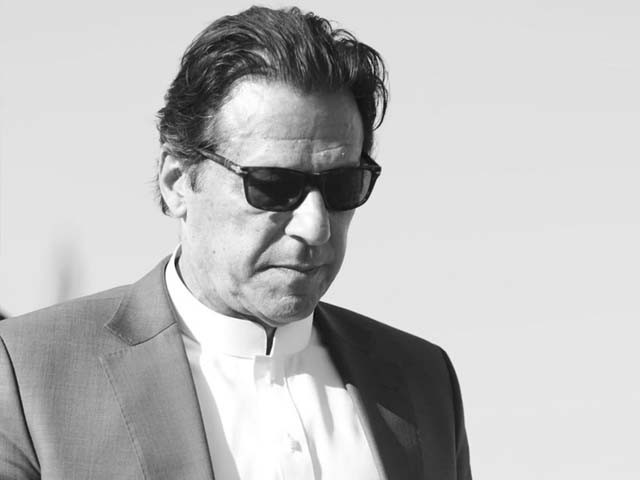
Is the Kaptaan out?
For the past few weeks, as his grip on power has steadily weakened, Imran Khan’s rhetoric has become more and more focused on the alleged role of foreign powers in Pakistan’s domestic affairs. According to Khan, America is behind the ongoing no-confidence motion, and there is a grand conspiracy to remove him. To put it simply, the narrative has shifted from ‘they are against me because I am against corruption’ to ‘I am being removed because I am standing against the West, particularly America, for pursuing an independent foreign policy’. His ministers, both current and former, have been active in defending his narrative, with Faisal Vawda and Fawad Chaudhry claiming that Khan’s life is in danger.
His latest speech, delivered on March 31, 2022, once again reiterated the same message. In fact, it appears he deliberately forced a ‘slip of the tongue’ in order to accuse America of orchestrating a grand conspiracy to oust him. He lashed out against “sell outs” and promised that neither they nor their “handlers” will be forgiven.
Is he correct about these vehement assertions? If not, then why is he making them?
To be honest, Khan’s assertion that America is planning his ouster and ‘buying’ local politicians is completely nonsensical. I am not saying that America as a superpower has never indulged in such tactics. It has been involved in regime overthrows during the Cold War, and for that purpose has gone to the extent of orchestrating coups, financing proxy wars and even direct invasions. Even after the Cold War, America has been involved in regime changes in Afghanistan (2001) and Iraq (2003).
However, historically, America undertook such steps when it considered a country to be of real importance when seen through the prism of realpolitik. During the Cold War, America intervened in strategically important countries which it feared would fall under the Soviet sphere of influence. Between 1947 and 1989, the United States (US) tried to change other nations’ governments 72 times.
After the Cold War, the US was again actively involved in regime changes, most notably in Afghanistan and Iraq. Here the reasons were largely domestic. In the case of Afghanistan, it was due to the Taliban government’s refusal to handover Osama Bin Laden to the US. On the other hand, America’s misadventure in Iraq was primarily part of the George Bush government’s strategy to extract domestic political benefits by indulging in what is known in International Relations literature as “rallying around the flag”.
It is also true that Pakistan has historically been an important country for America, and the US has shown an active interest in its political developments. During both the Afghan wars (1980s and then 2000s), the US actively supported military regimes in Pakistan at the cost of human rights and democracy.
However, despite the history, currently neither Pakistan nor its beleaguered and, frankly, powerless prime minister are important enough for America to take such a drastic step. America has already left Afghanistan and is no longer even remotely interested in any political developments there, and consequently, it is not interested in engaging in any drastic measures such as a regime change in Pakistan. America’s complete lack of interest in Pakistan can be gauged by the fact that Khan himself has been lamenting about President Joe Biden’s refusal to call him over the past one and half year.
In the case of the Ukraine war, the Pakistan Tehreek-e-Insaf (PTI) has tried to use the condemnation of the European Union (EU) over Khan’s refusal to castigate Russia as ‘evidence’ of a foreign conspiracy. However, it is clear that this was merely a moral condemnation since Pakistan is of no real importance when it comes to the war in Ukraine. Yes, Khan’s ill-timed visit to Russia was a diplomatic embarrassment for Pakistan, but it was by no means a potential ‘game changer’ under any circumstances.
Even if Pakistan did hold international significance currently, America and other western countries would have preferred to directly contact Pakistan’s military establishment instead of taking the extreme step of a regime change. Indeed, that has been their modus operandi in Pakistan for the past few decades.
Khan’s constant references to Zulfiqar Ali Bhutto are also completely misplaced. Bhutto made claims that America wanted to make a “horrible example of him”. Whether there was actually an active effort or not by America to dislodge him remains debatable, but at least Bhutto had sounder justifications for such a claim. At that time, the Cold War was at its zenith and Bhutto, being a powerful prime minister, was actually pursuing an independent foreign policy. He was trying to forge an Islamic block in the aftermaths of the Second Arab Israel war and the famous oil embargo imposed on America by the Organisation of the Petroleum Exporting Countries (OPEC) countries. Most importantly, he was also a pioneer of Pakistan’s nuclear programme.
By no stretch of the imagination can Khan even remotely be compared to Bhutto since there are huge contextual differences here. Khan does not enjoy the kind of power which Bhutto enjoyed and, as already discussed, those were very different times.
The worst aspect of this flawed narrative is Khan’s impact on his supporters (a large chunk of which hail from Pakistan’s urban middle class) who are ready to believe such absurdities and are getting angrier by the moment. Many are even buying his claim that America sent some ‘threatening’ letter to Khan whereas the existence of such a letter is highly doubtful. What is projected as some kind of letter is most likely an opinion from the Pakistani embassy in America.
So why then is Khan doing this? It is essentially a combination of Khan’s delusions of grandeur and a complete inability to come to terms with reality. It’s becoming increasingly evident that the days of the PTI government are numbered. At the moment, Khan does not enjoy even a simple majority in the National Assembly, and he has morally lost the right to continue as prime minister.
One would have expected that given his track record as a cricketer, he would understand and accept defeat gracefully. In politics, just like in cricket, wins, and even more importantly defeats, are temporary. However, Khan is instead bent on delaying the inevitable, and in the process is weaving a narrative which is completely flawed and can have real dangerous consequences for Pakistan's international standing as well as domestic politics.




COMMENTS (17)
Comments are moderated and generally will be posted if they are on-topic and not abusive.
For more information, please see our Comments FAQ